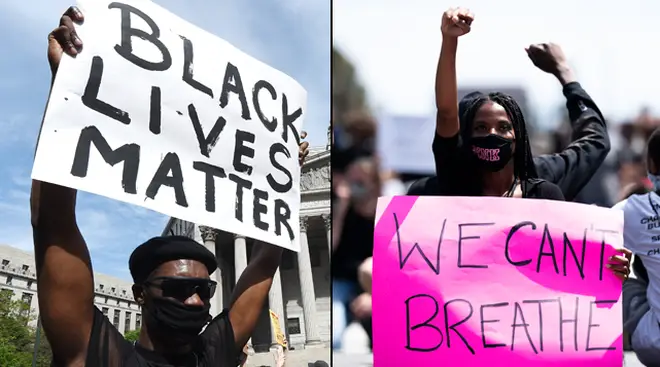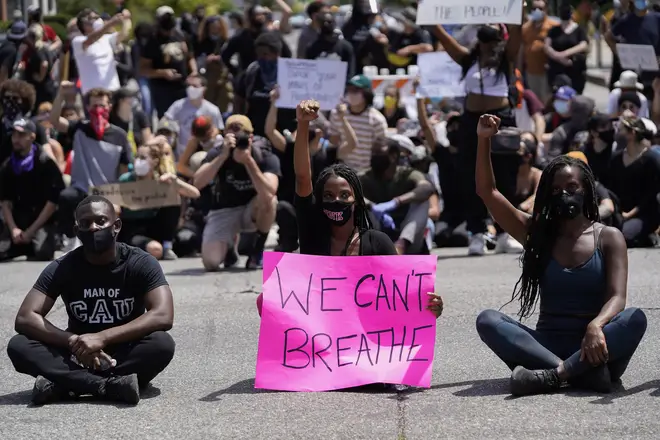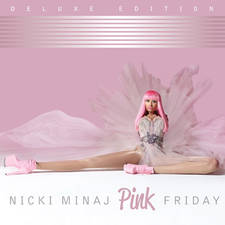Here's how to support Black Lives Matter protesters in the US and UK
12 June 2020, 19:37

Tessa Thompson shares peaceful Black Lives Matter protest video
From petitions and protests, to donations and important resources for mental health, allyship and anti-racism, whether you're in the US, UK or anywhere else in the world.
Black Lives Matter. Following the murder of George Floyd, a black man who was killed by a white police officer last week (May 25), people have taken to the streets to protest racism and police brutality, to demand justice for those who have been unjustly killed and to call for change.
If you've spent any amount of time on social media over the past few days you will have watched the protests unfold, you will have heard the names George Floyd, Breonna Taylor, Tony McDade, Ahmaud Arbery... and you may have wondered how you can help.
READ MORE: John Boyega calls out racists in powerful video about George Floyd
From petitions and protests, to donations and important resources for mental health, anti-racism and guidance on how to be a helpful ally to black people, here's a guide on what you can do, whether you're in the US, the UK or from anywhere across the world.

Sign petitions.
If you are unable to go out and protest for whatever reason, there are ways you can help from home. Signing petitions is helpful. Petitions can raise awareness and can place pressure on those mentioned to act.
The ‘Justice For George Floyd’ petition aims to “reach the attention of Mayor Jacob Frey and DA Mike Freeman to beg to have the officers involved in this disgusting situation fired and for charges to be filed immediately.” (Since the petition started, Derek Chauvin has had his charges upped to second-degree murder. The other three officers involved have also been charged with "aiding and abetting second-degree murder and aiding and abetting second-degree manslaughter".)
You can find a full list of petitions, including Justice For Breonna Taylor, curated by Twitter user @dehyedration, here at blacklivesmatters.carrd.co.
If you aren’t a US citizen but want to help by signing petitions, people have been sharing multiple zip codes that you can use.
If you're in the UK and are looking for petitions to sign, you can find several (curated by @tintendo3ds) at https://blmukpetitions.carrd.co/, including petitions for Belly Mujinga. The tweet below also links to several Parliament petitions, but you have to be a UK resident to sign them.
Petitions applying to the UK will not be considered if they’re on change. org. Here’s a list of the ones I could find on petition.parliment :
— YT: PinkyTheElf (@PinkyyTheElf) June 11, 2020
petitions you can sign.#BlackLivesMatter
— ً (@byersfilms) May 27, 2020
Donate.
If you have money to spare, consider making a donation.
If you want to donate to the families of victims, including George Floyd, Breonna Taylor, Ahmaud Arbery and Tony McDade, you can find a list of GoFundMe pages here. The George Floyd memorial fund, set up by Philonise Floyd, will cover “funeral and burial expenses, mental and grief counseling, lodging and travel for all court proceedings, and to assist our family in the days to come as we continue to seek justice for George.”
Following the protests, multiple organisations across the US are raising money to help post bail for arrested protesters and arrange lawyers. The Minnesota Freedom Fund have since raised over $20 million and are now asking people to donate elsewhere. If you want to donate to help protesters, you can find a full list of organisations and fundraisers here.
If you are in the UK, or live internationally, and want to donate, most of these sites accept international payments.
If you want to donate to support a UK specific organisation, you can find a list of suggestions here.
READ MORE: 28 brilliant black-owned fashion and beauty brands you can support right now
UK anti-racism charities and organisations you can support right now:
— ❥ (@Niaa_x) June 2, 2020
- Black Lives Matter UK
- Show Racism The Red Card
- Runnymede
- Stephen Lawrence Charitable Trust
- Stand Up To Racism
- Southall Black Sisters
- SARI Stand Against Racism and Inequality
black lives matter!!!!!!! 🖤 pic.twitter.com/qplstlk1LY
— chloe x halle (@chloexhalle) May 31, 2020
Join the protests.
Show up, speak out (but not over), stand with protesters and protect them.
If you attend a protest, make sure you wear a face mask. Bring hand sanitiser and try to maintain as much social distance as you can. Remember that we are still in the middle of a pandemic. Coronavirus is still a thing.
For those looking for more information on how to stay safe during a protest in the middle of a pandemic, Vice’s guide is extremely helpful. For more information on protest safety, preparation and support: HERE.
If you don't want to protest or feel like you can't safely join in at the moment, you can always support protesters in your city. Bringing extra water, masks, hand sanitiser, food or other things they might need can be helpful.

For non-black people supporting the protests in person, consider what Halsey shared on Twitter: "fucking listen to the black people speaking. You are not there to speak over them. If they are venting their pain and anguish out loud do not speak over them. Allies are there to help when help is needed. Not take control of the narrative. there’s enough of that already."
AND REMEMBER: Be careful with what you share online. Try and avoid sharing images of protesters who can be identified from videos. Also be mindful of the traumatic content in videos you share.
if you’re in boston tonight remember this. actually, any future protests you go to period. pic.twitter.com/Jx5Rafklug
— Larry ✊🏽✊🏾✊🏿 (@laurielovelugo) June 2, 2020
Listen, learn and educate.
If you feel that you aren’t as educated on the matter as you should be, listen and learn. Ask what your black friends need but do not rely on them to tell you what you should be doing. Do your own research. As white people, we need to acknowledge our privilege and look at the ways in which we are complicit in racism and change it. "It is not enough to dislike racism, you need to work towards antiracism," writes editor Mireille Charper.
There's currently several helpful threads circulating Twitter and Instagram that aim to highlight the ways in which allies can help, including a Google doc full of anti-racism resources compiled by Sarah Sophie Flicker and Alyssa Klein.
If your timeline hasn't been full of posts or retweets from the protests or ways in which people can help, then you're following the wrong people. Consider following accounts like Munroe Bergdorf, Candice Brathwaite, Rachel Cargle, Mona Chalabi, sassy_latte, Ibram X. Kendi, Kenidra R. Woods, Brittany Packnett Cunningham, Ava DuVernay, Austin Channing Brown, Indya Moore, Angelica Ross and Jackie Aina, to name a few.
READ MORE: Netflix launches Black Lives Matter category to amplify Black storytelling
You can also learn by watching TV shows, films or reading books and listening to podcasts. Books like 'Why I'm No Longer Talking to White People About Race' by Reni Eddo-Lodge and 'White Fragility' by Robin DiAngelo are must-reads. TV shows, films and documentaries like Ava DuVernay’s 13th and When They See Us, as well as Dear White People, written by Justin Simien, are a must watch on Netflix.
Also, challenge and call out your family and friends when they say something that you know is either racist or a microaggression. Your parents or siblings may not use social media in the same way you do. Bring the videos of the protests to the table. Change starts with those closest to you.
Share mental health resources and check on your friends.
While it’s important to be active and speak up on whatever platform you have, it’s also important for you to take care of your own mental health and be mindful of others. For people on social media, particularly black people, this will be overwhelming.
It’s extremely important that you take a break if necessary. It’s not shameful, nor does it mean you don’t care, if you take time away or log off for a while.
Twitter user @mayarichardsun has shared an extremely useful resource list for those who need to speak to someone about how they’re feeling.
Retweet the links, and check on your friends.
i’m really worried about black people’s mental health. about young black people on social media seeing this in full for the first time. here are some resources:
— maya (@mayarichardsun) May 27, 2020
thread on how you can protect your energy and calm your anxiety during this time ✨
— 𝒩𝑜𝓉𝓉𝓎 ➰ (@nottydesignss) June 2, 2020
HEY NONBLACK FOLKS
— kelendria keys slider @ O. Cassidy Island 🍊 (@makirollOFC) May 31, 2020
i see a lot of "check in on your black friends" posts and they are well intentioned, but please be mindful of HOW you are checking on your black friends.
here is a thread on how to check in on your black friends.
This article will continue to be updated with resources.



